Do you ever notice there is a person who maintains the dignity of matches in different sports and what is the key role of that person in every sport? That person is none other than a referee. The referee is considered the backbone of any sport because the referee ensures fair competition. The player job is tough but the referee job is the tougher one.
The referee carries a heavy burden of duties and responsibilities on his shoulders so the match can be played with clarity and discipline. Basketball is a complicated game that makes a referee’s role more crucial in a game. The referee is also referred to as an official who is responsible to enforce the rules and regulations of the game. The title of the official is also used for scorers, timekeepers, and other personnel that play an important role in officiating the game.
The referee in a basketball sport is the most skilled person that can easily officiate a game despite the speed of play and complexity of rules. The game is played in a safe and fair environment under the referee’s supervision. The referee’s duty is to identify a violation and foul and then issue the correct penalty to continue the game.
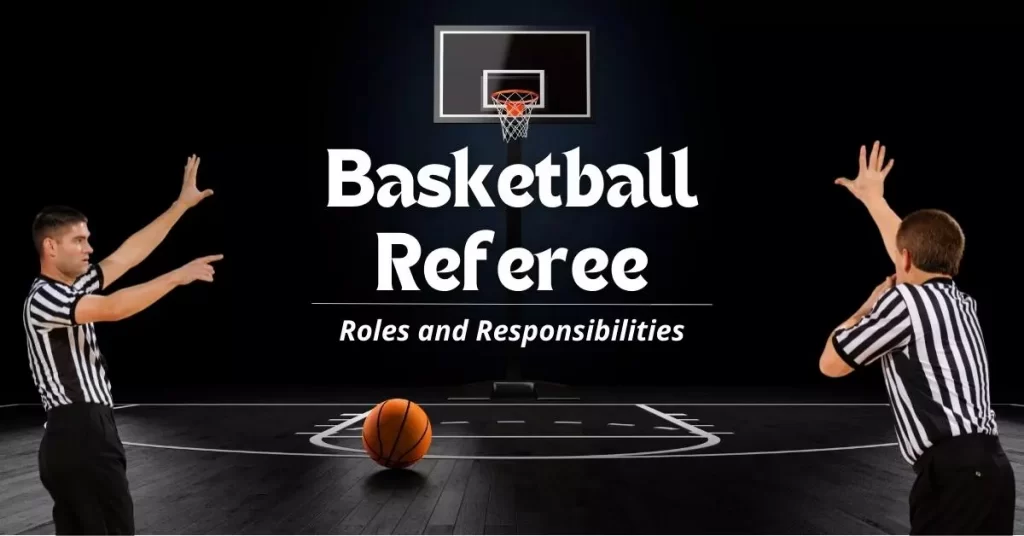
The count of officials can vary in other basketball leagues and associations. The official team crew consists of two or three members. One lead referee and one or two umpires perform their duties in the match. In the NBA, the lead referee is referred to as the crew chief with one referee and one umpire while in FIBA matches two-man crew consists of a referee and an umpire to officiate the match; however official scorer, trained timers, and courtside administrator also perform their part of duties on the court. Let’s have a detailed look at the below details for a better understanding of basketball referee roles in the matches.
Roles of Referee in Basketball
The referee has performed multiple types of duties in a match. The referee ensures the game runs smoothly and makes plenty of decisions to determine a violation and issue a correct penalty. In case of any violation, the referee stopped the game by blowing a whistle and awarding the ball to the opposing team. The referee is responsible for player and spectator management. The referee also checks out the court conditions and equipment to ensure that all equipment is safe and in usable condition. If there is any issue found then the referee will rectify it.
Court and Equipment Inspection:
One of the basic duties of the referee is to inspect the court and equipment including baskets, balls, backboards, scorer, and timer equipment. The referee will make sure that backboards and baskets are of a premium quality standard and securely mounted. If everything is ok then the match will be started and in case of any issue with equipment, the official will rectify it immediately.
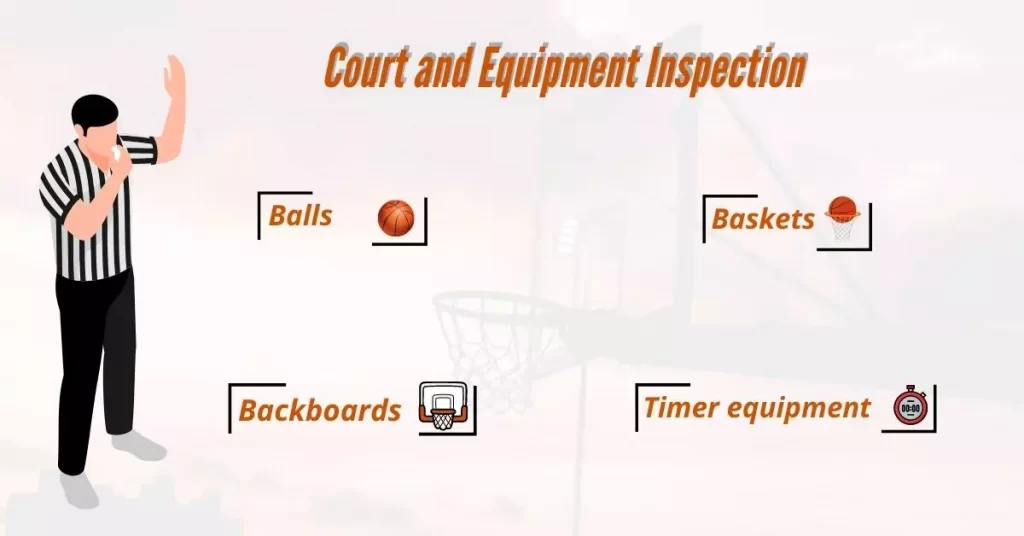
Checking of Hard Substances:
The referee has to check that no player carries any jewelry or wears hard substance equipment. The casts, splints, guards, and braces are well padded or covered with foam and have no exposed sharp edge. The purpose of checking hard substance equipment is to provide a safe game environment.
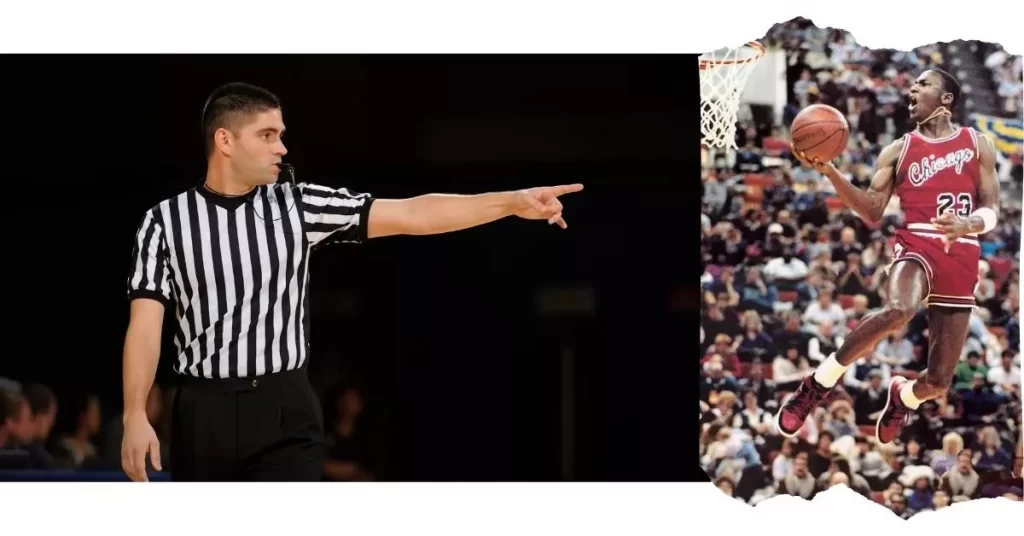
Foreign Substance:
The Referee makes sure to restrict the usage of any foreign substance match. A foreign substance cannot be used on a player’s body, uniform, or equipment, or on any game equipment that provides the player a competitive advantage.
Ball Check:
The referee has to check the pressure of the ball before starting the game. The ball must be properly inflated. The referees make sure the ball pressure must be between 7 ½ and 8 ½ pounds.
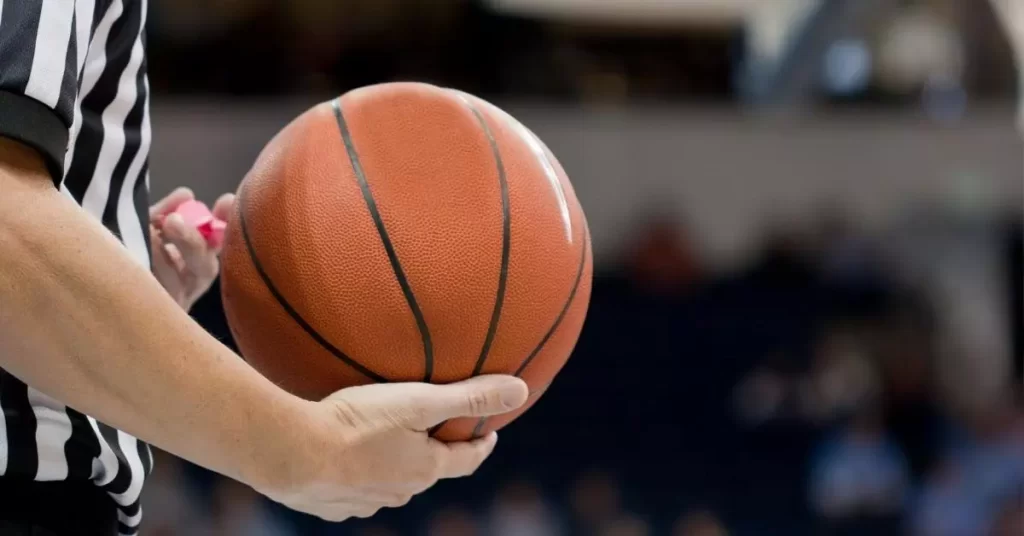
Entrance to Court:
The referee is bound to enter the court prior to the 15-minute mark on the game clock to check the warm-up period and in typical situations referee report to the league office. The referee also reviews scoring and timing procedures with table personnel.
Begin the Game with Jump Ball:
One of the referee’s roles is to perform the jump ball to begin or resume a play. In FIBA the jump ball is performed by the referee but in NBA this role can be also performed by other officials.
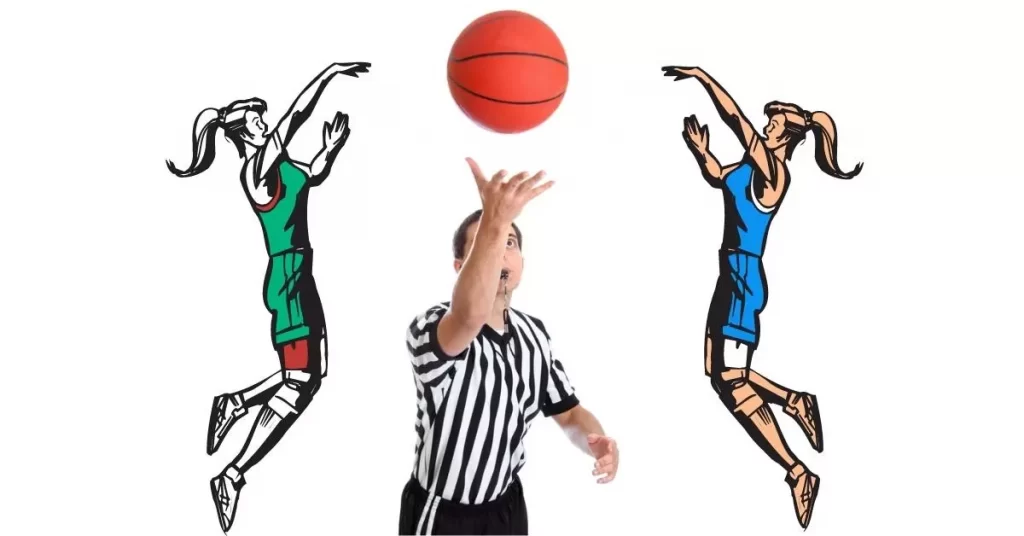
Toss the Ball:
It is the referee’s duty to toss the ball at the start of the game. The referee also decides whether a goal shall count or not. In case of any dispute, the crew chief has the right to clear the dispute between officials.
Foul and Violations:
This is one of the most important roles of a referee to observe fouls, and violations and do the right decisions as per the standard operating procedure. In case of a foul, the referee blows the whistle to stop the play. The referee will inform the official scorer about the number of offenders, the type of foul committed, and the number of free throws.
If any violation has occurred in the game then the referee indicates the nature of the violation by giving the appropriate signal, the number of offenders, and the direction in which the ball will be advanced. The referee is also eligible to suspend play for any suspicious or unusual circumstance.
Referee Hand Signals:
In a basketball match, the referee frequently uses hand signals on the game. Well, the referee uses hand signals to communicate with other officials and players. The hand signals provide a quick means of communication so the flow of the game will not affect. Hand signals are the most effective way to communicate because there is so much noise in the court that you cannot convey your message verbally. Below is the list of referee hand signals.
- Blocking
- Charging
- Holding
- Jump Ball
- Double Dribble
- Carrying or Palming
- Personal Foul
- Technical Foul
- Travelling
- Three Point Attempt
- 3 and 5 Seconds Violations
- Half Court or Backcourt Violation
- Hand Check
- Intentional Foul
- Start and Stop Clock
- Timeout
Conduction Safe and Fair Game Environment:
The referee plays an important role in crowd management so that game will be played without any interruption. The referee closely observes any misconduct on the court and maintains the discipline of the game by making plenty of decisions. The referee ensures the player’s safety and provides them with a safe environment on the court.
Common Asked Questions (FAQ’s)
How many officials are there in basketball?
In basketball matches, there are many officials who offer their duties according to their specific designation. There are almost 7 officials who maintain the order of the game. The lead referee or crew chief, two referees, one scorekeeper, two-time keepers, and one replay center official. It is the collective efforts of all officials who ensure a fair game and have an active task in maintaining the game.
Who are the Top 5 NBA referees of all time?
There are a lot of referees who officiate many matches in the NBA but when it comes to the best referees there are very limited names. Below is the list of the best referees in NBA history.
- Mendy Rudolph
- Dick Bavetta
- Joey Crawford
- Earl Strom
- Darell Garretson
- Bob Delaney
What is the importance of officiating in basketball?
Officiating is a compulsory part of basketball because there are many officials who play an active role in officiating the match. The officials maintain the game integrity and ensure there is no foul play in the game. If no official officiates the game then the game cannot be held properly in an organized manner because the officials provide guidance and ensure a safe environment.
Conclusion:
The referee’s role is crucial in basketball because he is the only person who identifies fouls, and violations and makes quick decisions to conduct the game fairly. The referee is also the most knowledgeable person who ensures that the game is played in an organized manner and no one violates the rules of the game.
A lot of people want to start their career as a referee then you can see complete details in this article how to become NBA referee. The roles of a basketball referee can be very challenging due to the complexity of the game that’s the reason a referee has to go through intense training programs so they can smoothly run the game with the help of their vast knowledge.